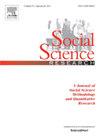可信度和/或焦虑——移民政治信息的调节者
IF 3.5
2区 社会学
Q1 SOCIOLOGY
引用次数: 0
摘要
在移民宣传运动的政策中,西方政府旨在影响潜在移民输出国对非正常移民的看法。虽然信息运动被称为西方边境政治的“道德部分”,但批判性研究文献质疑其合法性,因为信息会引发焦虑,而且西方实施者在全球南方(缺乏)可信度。根据心理学的双过程理论,以及关于政治中可信度和情绪的文献,我预计,由焦虑和/或可信度调节的信息提供,通过增强对非正规移民盛行的认识,同样起到了信息更新的作用,但通过不同的理论框架。为了理清独立和相互依赖的影响,我在一个真实的欧洲移民信息运动中进行了两种独立处理的实地实验,涉及2612名尼日利亚人。总体信息效应结果显示,周围人群对不规则迁移的普遍程度有所增加,而将其归因于自己时,不规则迁移的普遍性有所下降。作为调节因子的可信度和焦虑程度,每个调节因子和共同调节因子都达到了相似的水平,但结果不同。如果发送者的可信度得到保证,一般话题流行度的感知会增加,只会轻微改变自我估计,而焦虑触发会增强自我归因,即自己对不规则迁移的共性,而一般流行度的感知则会减弱。结果支持理论双过程框架的两种不同路径。此外,通过提供因果关系和多处理证据,本研究有助于就移民政策的实际实施、其目的和更广泛的信息传播技术进行规范性辩论。本文章由计算机程序翻译,如有差异,请以英文原文为准。
Credibility and/or anxiety - The moderators of political information on migration
In the policy of migration information campaigns Western governments aim to influence perceptions on irregular migration in potential sending countries. While information campaigns are called the ‘ethical part’ of Western border politics, critical research literature questions their legitimacy due to anxiety-inducing messages, and the (lacking) credibility of Western implementers in the Global South. Drawing on dual-process theories from Psychology, and literature on credibility and emotions in politics, I expect that information provision moderated by anxiety and/or credibility are equally performing an information updating by enhancing the perception of the prevalence of irregular migration, but via different theoretical frames. To disentangle the independent and interdependent effects, I conducted a field experiment with two independent treatments in a real European migration information campaign reaching 2612 Nigerians. The overall information-effect results reveal an increased perception of irregular migration prevalence in ones surrounding, and a decrease in commonality of irregular migration when attributed to oneself. The moderators, credibility and anxiety, achieve similar levels per moderator and jointly but for distinct outcomes. If the credibility of the sender is assured, the perception of general topic prevalence is increased and only slightly changes the self-estimate, while anxiety-triggering enhances the self-attribution, i.e. own commonness of irregular migration and less so a general prevalence perception. The results support the two distinct paths of the theoretical dual-process framework. Additionally, by providing causal and multi-treatment evidence, this study contributes to a normative debate on the practical implementation of a migration policy, its purpose, and techniques in information transmission more broadly.
求助全文
通过发布文献求助,成功后即可免费获取论文全文。
去求助
来源期刊

Social Science Research
SOCIOLOGY-
CiteScore
4.30
自引率
4.00%
发文量
0
审稿时长
65 days
期刊介绍:
Social Science Research publishes papers devoted to quantitative social science research and methodology. The journal features articles that illustrate the use of quantitative methods in the empirical solution of substantive problems, and emphasizes those concerned with issues or methods that cut across traditional disciplinary lines. Special attention is given to methods that have been used by only one particular social science discipline, but that may have application to a broader range of areas.
 求助内容:
求助内容: 应助结果提醒方式:
应助结果提醒方式:


